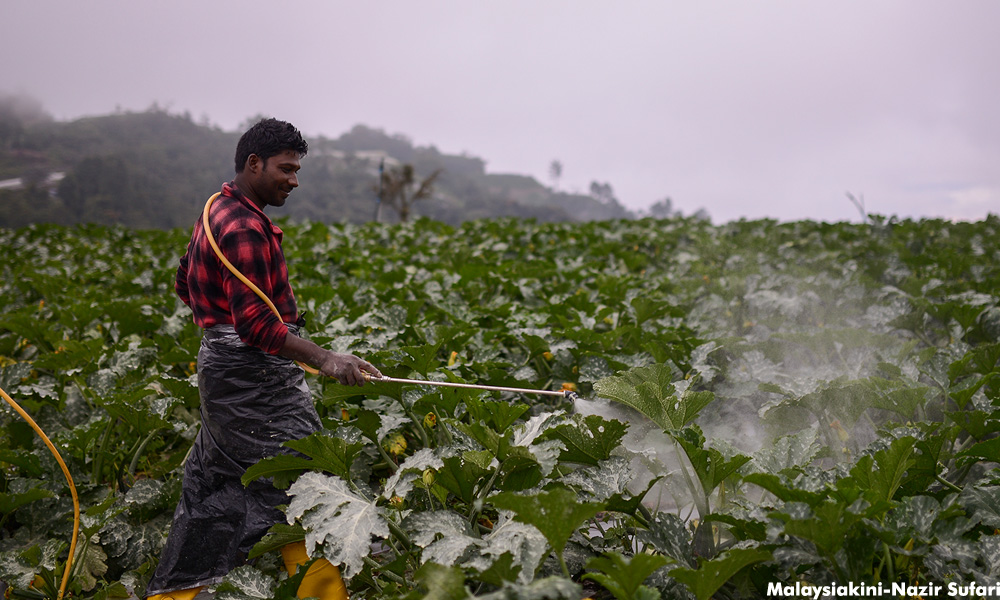LETTER | Emir Research’s Q3 2020 Focus Group Discussion (FGD) findings have highlighted concerns over food safety, security and sovereignty as major themes or issues as raised by the two groups of discussants, namely the farmers and consumers – that have been brought to the forefront by Covid-19 and the imposition of the movement control order (MCO), especially in the initial phase of transmission.
Food safety is specifically linked to the non-use of pesticides as contaminants in their own right, and which otherwise would increase the risks of health hazards especially when the level is high. Food security, on the other hand, is all about continuous availability of and access to the food supply chain for all of society, irrespective of demography (socio-economic background) or geography (region). Finally, food sovereignty simply means the capacity and capability of a country to be self-sustaining by not being overly reliant on external sources or food imports.
Towards that end, agricultural industrialisation is key to addressing the sustainability and future of our country’s food industry from the aspects of safety, security and sovereignty.
It is the integration of agriculture and industry within the supply chain alongside the focus on the application of industrial methods and technology, including digitalisation, to enhance crop outputs both in terms of quantity as well as quality, including safety, which in turn tends to provide for the conditions of approximating food sovereignty.
Agricultural industrialisation has been emphasised under the Malaysia Plans.
Under the Ninth Malaysia Plan (2006-2010), the emphasis was on the “New Agriculture” to revitalise agriculture to fulfil the role as the third engine of growth, i.e. attaining near-levels of food sovereignty – expressed in terms of a balance of payments surplus (or net exporter). The 9MP also created five high-impact projects, namely: permanent food production, aquaculture industry zone, the national feedlot centre, contract farming, and nurturing agropreneurs.
Fast forward to the 11th Malaysia Plan which is coming to an end this year, when it came to the food security level, we ranked second among Southeast Asian nations. Based on studies done by the Economist Intelligence Unit, Malaysia ranks 41 out of 113 countries on the Global Food Security Index. Malaysia is second behind Singapore and ahead of Thailand and Vietnam.
At the same time, the continuing push for agricultural industrialisation under the 11MP also has in view food safety and quality through intensifying the implementation of quality assurance programmes for agriculture produce. Certification programmes such as the Malaysian Good Agriculture Practices (myGAP), Malaysian Organic (myOrganic), Good Manufacturing Practice (GMP), Hazard Analysis and Critical Control Point (HACCP) and halal certification are to be further promoted and entrenched along the entire spectrum of the food supply chain.
To further boost and augment agricultural industrialisation to attain the goals of food safety, security and sovereignty, EMIR Research would like to propose the following policy proposals:
1. Food safety
The Ministry of Agriculture and Food Industry (Mafi) together with the Malaysian Agricultural Research & Development Institute (Mardi) should step up their efforts by introducing timelines and deadlines for the phasing out and ending the use of pesticides (which also includes herbicides and insecticides) and substituted with natural or organic mechanisms otherwise known as biocontrol, ie the use of biological agents for pest destruction. The timetable should also be aligned to termination of subsidies for pesticides.

Mafi and Mardi have already jointly-produced the Diadegma and Cotesia wasp-type parasitoids as well as the Tiger Fly (a type of a fly), for use to control Plutella moth and leaf miner infestations.
In the meantime, a concerted campaign nationwide to promote biocontrol techniques and abandon the use of pesticides involving Mafi, Mardi, regional agricultural development authorities, farmers’ associations and NGOs should be intensified.
2. Food security
Incorporate the Integrated Agricultural Development Projects (IADPs) into all regional economic corridors. This would also spur the integration of the entire food supply chain and facilitating the digitalisation process. Food supply chain resilience would be enhanced by ensuring uninterrupted channels and networks of distribution, including via e-commerce.
Every stage of the food supply chain should be subject to a traceability and tracking system in the use of, for example, RFID (radio frequency identification) technology.
There should also be a re-emphasis on collectivisation of agricultural lands such as padi fields grouped into clusters of mini-estates as self-contained mini production centres with the choice and capacity to by-pass conventional supply chain channels such as existing strategic partners like BERNAS. This is consistent with the further liberalisation of the rice market.
3. Food sovereignty
Extensive land rehabilitation projects for agriculture should be seriously considered. There could be joint ventures in the form of a triple alliance between the federal government (Mafi), state development corporations and the private sector.
These projects would increase the number of Permanent Food Parks (PFPs) that had been designed as one of the strategies under the 3rd National Agriculture Policy (DPN3). PFPs should be earmarked as analogous to free trade or industrial zones – with tax incentives and with a new emphasis on promoting digital agriculture.
Ultimately, integration and assimilation of both urban and agricultural industrialisation should be implemented in line with a Total Planning Concept (TPC), where agriculture is part and parcel of the economic activities and environmental sustainability of any development projects. This includes urban farming – home, vertical, hydroponic and aeroponic – as driven by artificial intelligence (AI), Internet of Things (IoT), precision analytics, and Big Data.
The upcoming 12th Malaysia Plan is expected to give renewed drive towards promoting agricultural industrialisation and take Malaysia on to the next level in ensuring the sustainability of our food safety, security and sovereignty.
JASON LOH SEONG WEI is head of Social, Law and Human Rights at EMIR Research, a think tank focused on strategic policy recommendations based on rigorous research.
The views expressed here are those of the author/contributor and do not necessarily represent the views of Malaysiakini.

